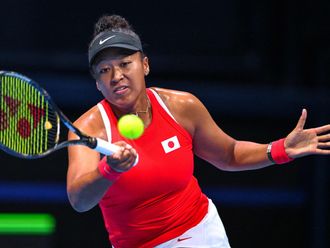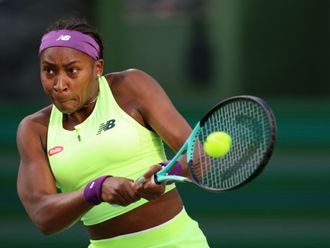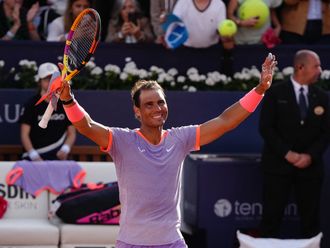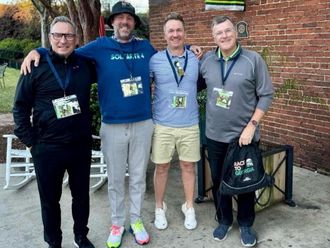Washington: Chris Evert was a 16-year-old schoolgirl when she first played Billie Jean King in a Grand Slam. And while the 27-year-old King sent the pig-tailed amateur packing, 6-3, 6-2, in the 1971 US Open semi-finals, she realised then that Evert represented the future of women's tennis. Last weekend, Evert and King shared a courtside table at Kastles Stadium on the Wharf, where Washington's World Team Tennis squad extended its unbeaten mark to 9-0 with a victory over the St. Louis Aces.
King, 67, co-founder of the co-ed professional league, and Evert, 56, who played three seasons of Team Tennis during a Hall of Fame career that spanned 17 years, spoke about that first meeting at Forest Hills, 40 years ago, the influence they've had on the game and one another since. Some excerpts:
What was it like to face King at the US Open when you were 16?
CHRIS EVERT: At Forest Hills you have to walk down a long sidewalk lined with all these people. It was overwhelming. I was a girl from Fort Lauderdale, and Howard Cosell came and interviewed me. And there were people lined up — this was before security and the 1993 attack on Monica Seles — and people were touching me. Afterward, Billie Jean goes, ‘Wow!' This is unbelievable! She said this to me: ‘You are riding the crest of a wave! Enjoy it!' And I didn't know what the hell she was talking about! ‘Do you want me to go surfing?' I was 16 and dumb. ‘You are riding the crest of a wave'? I memorised it, and went back home and asked. And somebody explained it to me.
She was always supportive. I heard later on, when the girls [in the locker room] were complaining about me [for being aloof], Billie told them: ‘She's good for the game! She's going to put money in our pockets, so quit complaining.'
What was the tactical challenge of playing King in that US Open semifinal?
I went on the court with her not knowing what to expect but thinking she was going to be serve-and-volley and really powerful. All she did was chop, slice and drop shot to throw my timing off. I needed to get into a rhythm. She knew I needed to get into a rhythm. So she just chopped me up; she didn't even play her game.
What do you remember about Evert's potential at 16?
Billie Jean King: When I saw Chris, I told the other players, ‘We have finally found our next generation superstar!' I watched her play Mary Ann Eisel in the first round at the US Open. She was down six match points, and she made every single shot. I remember I got up from my seat and walked away, thinking, ‘This one has got that fight!' I went over and told everyone I had just seen the next great champion. ‘She's our superstar!'
King was a mentor to you off the court, as well. How did she help as you moved from adolescence to adulthood?
EVERT: Actually she started when my engagement to Jimmy [Connors] was broken. I was 19, 20. I went to a tournament right after. I could always talk to her about my love life. She saw that I was really down, and I started talking about it. She looked at me and said, ‘Chrissie, you have to be happy within yourself, and you have to know yourself really well before you're in a relationship.' She always gave me that kind of good advice. And later on with the [Women's Tennis Association, which King founded in 1971], she groomed me and Martina [Navratilova] to become leaders. We weren't exactly the brightest players or most well-educated, but she felt the players would listen to us because we were the top players. She taught me about how to run a tournament and what sponsorship was and about responsibility.
Even though you obviously wanted to beat Evert on court, was there part of you that wanted to see her succeed?
King: We had just started our tour in 1971. It was the first year we had a professional [women's] tour. Chris was perfect timing. We were very fortunate Chris came along at a time when we needed something special and a shot in the arm. She was the one. It was great to pass the baton to Chris Evert. It was very thrilling. I hated losing to her, but I didn't have any problem. The writing was on the wall.
Tennis is primarily an individual sport. What's the best and worst thing about that?
EVERT: Not every child is cut out for an individual sport. I've seen that the last 15 years, having an academy [Evert Tennis Academy]. A lot of kids come in who are so talented and so good, but they are just traumatised by pressure. You see the ones that embrace the competition, the pressure, and you can see the ones that are scared of it. I think team sports probably teach you more about giving — about being unselfish and being flexible. To be a tennis champion, you have to be inflexible. You have to be stubborn. You have to be arrogant. You have to be selfish and self-absorbed.
When did you know you had the stomach and nerve for competition?
EVERT: I was forced into it at six years old. My dad took me away from my girlfriend's house, where I was having barbecues and going swimming over to Holiday Park, where he had a basket of tennis balls and he'd just be throwing me tennis balls. I was really resentful in the beginning, but at six, I didn't know how to say that to my dad. I didn't know how to talk, anyway. I couldn't put a sentence together, so I wouldn't have been able to articulate it anyway. But then it sort of snowballed, and other kids came to Holiday Park and I had friends and we played against each other and got better and better.
What did playing TeamTennis do for Evert in 1976-78, when she played for the Phoenix Racquets and LA Strings? And what's her role with Team Tennis today?
King: I noticed when she was on the team she was laughing more, having a good time but working very, very hard at the same time. It was maybe a better balance for her; not just one-dimensional. I think the socialisation for her was really good. And now, since Anna Kournikova has left to do ‘The Biggest Loser' [succeeding coach Jillian Michaels], Chris is doing what Anna was supposed to do — clinics and sponsor appearances. She has been to Boston, to Philly — made four or five appearances for us.











